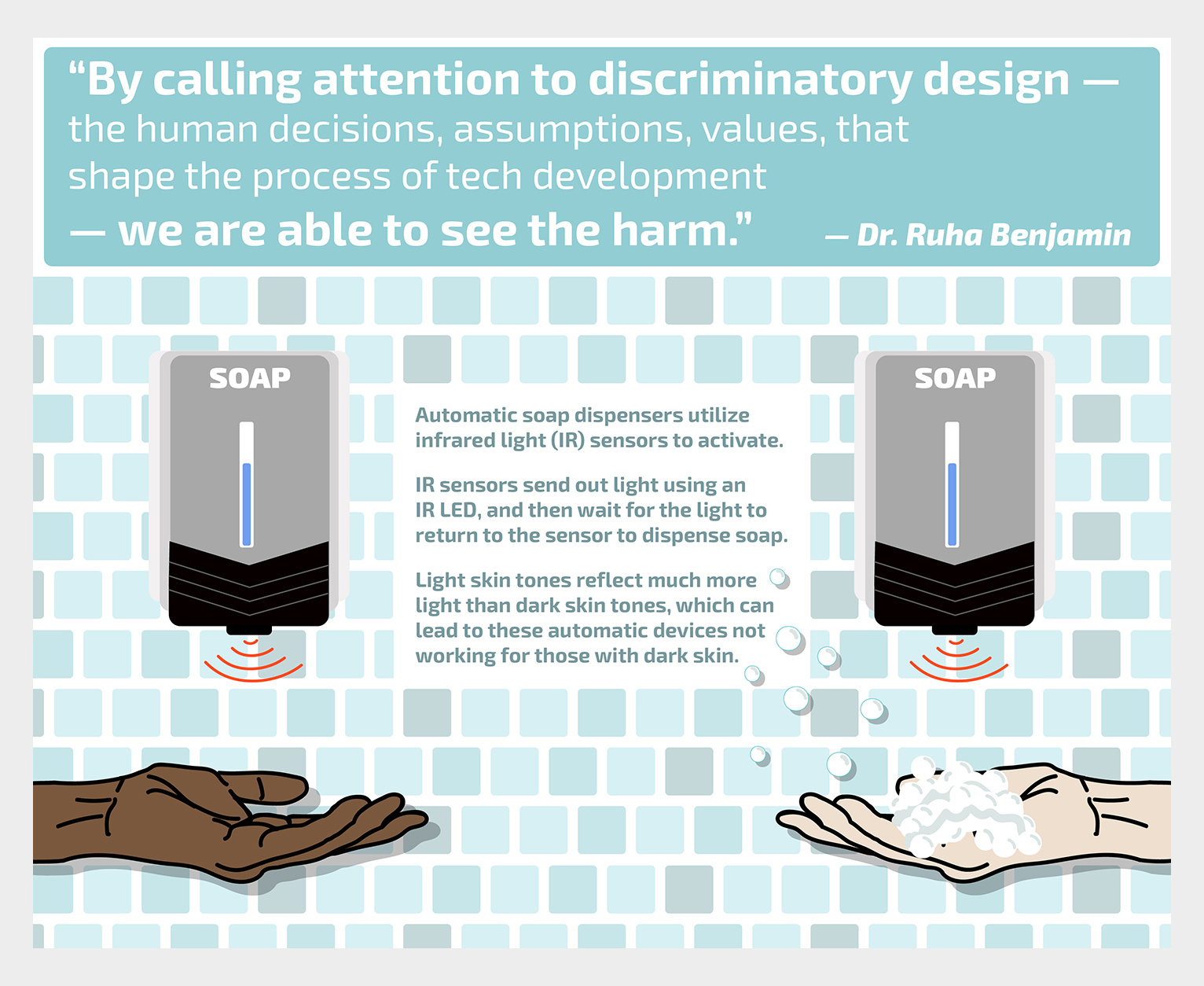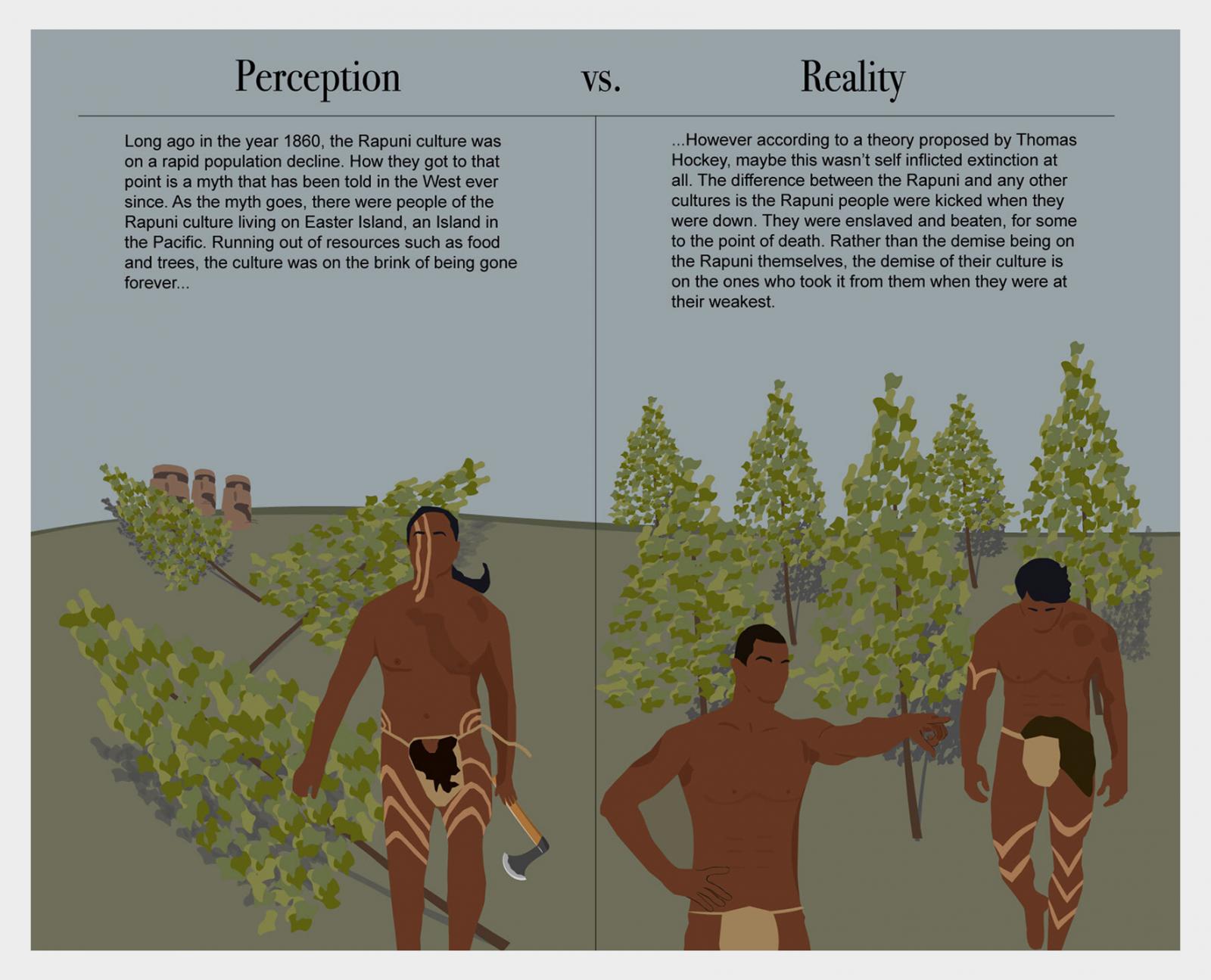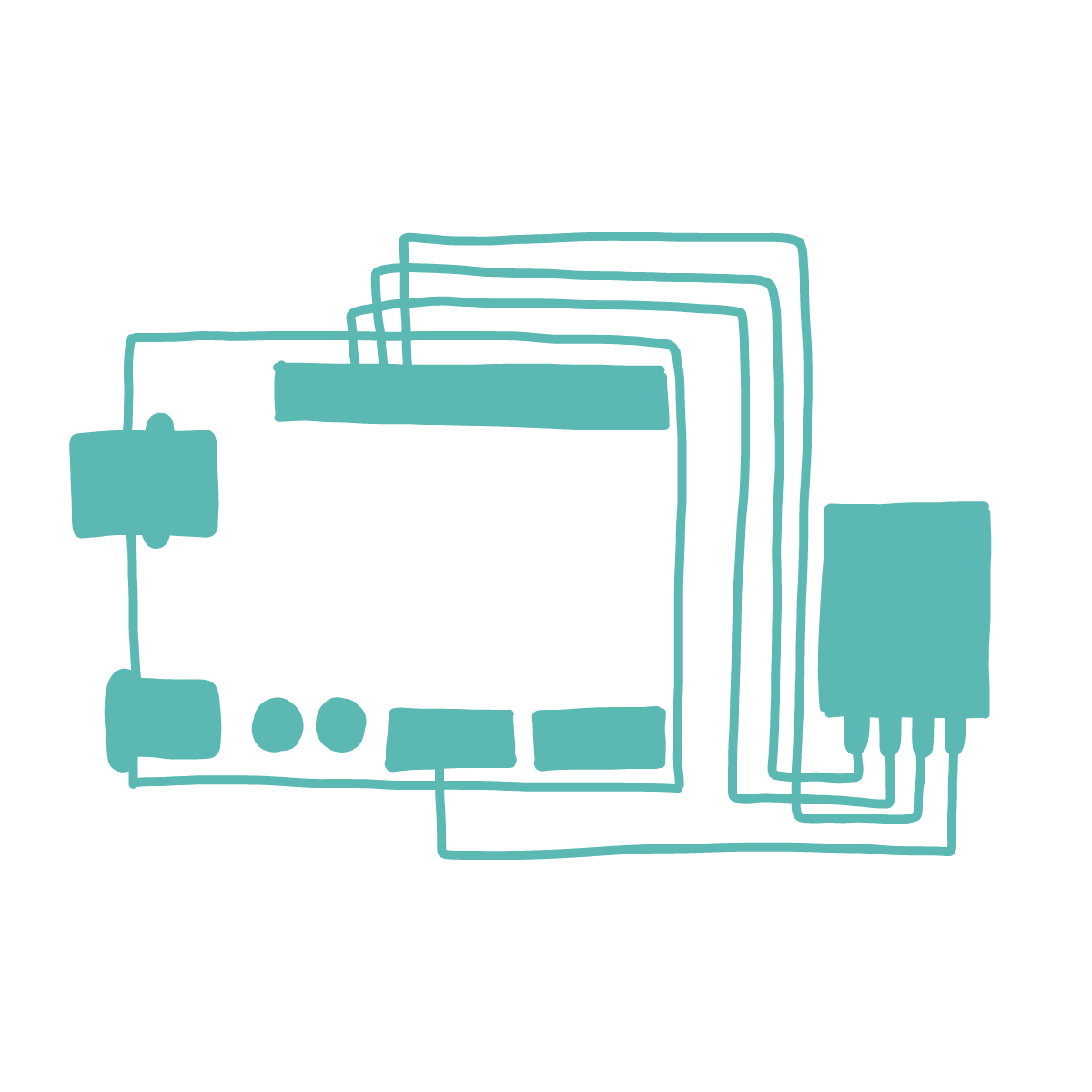...

Explore & Engage
...
...
The term "systems of oppression" helps us better identify inequity by calling attention to the historical and organized patterns of mistreatment. In the United States, systems of oppression (like systemic racism) are woven into the very foundation of American culture, society, and laws.
—Talking About Race, The National Museum of African American History and Culture
...
...
...

Illustration by Interactive Digital Studies students Gracie Behr and Sam Smith with Gabi Cummings
Race to the Future
In Race to the Future: Reimagining the Default Setting of Technology and Society, Dr. Ruha Benjamin discusses and provides examples of how the design and implementation of technology has intended and unintended consequences which support systemic racism. Watch the 35-minute presentation, then refer to this handout to discuss questions prepared by UNI’s STEM Coordinator, Marcy Seavey, and complete the activity by making a future technology pledge. (Video length 33:57).
...

Diversity Colloquium: Race, Social Justice, and Policing
On Oct. 15, 2020, a panel moderated by UNI Professor Ashleigh Kysar-Moon discussed issues related to racism, racial violence, protest, activism, police brutality and their impact on the community. Panelists included Ryan Stevenson, a congressional staff member for Congresswoman Abby Finkenauer, a local social justice activist and UNI Alum (2018); Waterloo Police Chief, Dr. Joel Fitzgerald; and UNI Professor of Criminology, Gayle Rhineberger. (Video length 1:31:01).
...
...
Leadership in Stopping Racism and Gender Violence
The video, Leadership in Stopping Racism and Gender Violence, describes the role we can all play as pro-social, active bystanders within our peer or work groups whenever racist or sexist comments and innuendos emerge. Although the original audience for this project was secondary school coaches and their male athletes, the video explores ways to challenge and confront harmful racist and sexist language and behavior anywhere, and discusses practical tools and approaches to stop it.
The Race to Equality is an interactive activity guide for athletic coaches to use with their student athletes, though it can be used by anyone to help them move from inaction to action. This guide invites participants to reflect on personal attitudes and beliefs about race and racial diversity, revisit key, historical policies and practices our nation’s leaders used to discriminate against persons of color, and examine a social scenario that stereotypes members of the black community. As a result of this guide, student participants will create and rehearse multiple ways they and their peers can “show up” in social situations when racial biases and prejudices appear. Leadership in Stopping Racism and Gender Violence and Race to Equality were submitted by Alan Heisterkamp, Ed.D., who serves as the director of the Center for Violence Prevention at the University of Northern Iowa. Dr. Heisterkamp conducts training and workshops on gender violence prevention strategies and the bystander approach using the Mentors in Violence Prevention (MVP) model and the Coaching Boys Into Men program. (Video length 20:55).


Natal
In episode two of the Natal podcast, “Roots of the Black Birthing Crisis," Martina Abrahams Ilunga explores the history of modern obstetrics and gynecology and how flaws in medical education and research contribute to the Black birthing crisis. For Black mothers in the Cedar Valley, we recommend visiting The Birth Hour for support and for maternal health resources. If you are a Woman of Color living in the Cedar Valley and you would like to share your birthing story, contact Disa Cornish (disa.cornish@uni.edu).
...
...
COVID-19 and Health Inequality at Home and Abroad
On September 24, 2020, the Lawrence Jepson Forum presented a free public online event discussing how the COVID-19 pandemic impacted people in the US and other developed countries differently and contributed to health inequality. Shahina Amin, the Lawrence Jepson Professor of International Economics, moderates the discussion. Five speakers are featured: (1) Michele Devlin, UNI Professor of Public Health and Education & Director of the Iowa Center on Health Disparities, (2) Sharon Duclos, Co-medical Director of the Peoples Community Health Clinic in Waterloo, Iowa, (3) Keyah Levy, Associate Director of the Multicultural Education Services/Gender and Sexuality Services at UNI, (4) Alejandro Murguia-Ortiz, Community Organizer at American Friends Service Committee-Iowa, and (5) Nicole L. Novak, Assistant Research Scientist for the Prevention Research Center at the University of Iowa College of Public Health. (Video length 2:24:01).
...
...
19th Amendment Matters
This lecture by UNI Professor Catherine H. Palczewski, richly illustrated with photos, postcards, and archival documents, explores the visual and verbal arguments for and against woman suffrage that circulated in the last decade of the debate over the Susan B. Anthony Amendment. Particular attention is paid to Congressional debates, pro- and anti-women suffrage postcards, the 1913 D.C. parade, the 1917-1919 Silent Sentinels, and the 1919 Prison Special in which women enacted their citizenship while simultaneously exposing their vulnerability to state violence and to violence from their ostensible male protectors.
But, this description needs to be refined, for bodies are never abstract and universal but are intersectional and experience intersectional forms of oppression. Bodies are raced, sexed, classed, and gendered. If the goal of the procession, pickets, and prison was to visualize the injustice done to women, then attention to which women’s bodies were visualized is essential. Even though at least 43 Black women participated in the 1913 procession, a photograph of only one of them exists despite hundreds of photographs of the parade surviving. Even though at least two Black women served as Silent Sentinels, no photographs of them picketing the White House exist despite the dozens of images of the Silent Sentinels that are available. But, it is not merely the absence of visual evidence of Black women’s activism that is important to note. During the Prison Special, as the NWP was seeking one last Senate vote and it would most likely be from a southern Senator, the white Specialists used Black women co-prisoners as a constitutive outside for white women’s citizenship. (Video length 1:28:01).


Equity by Design
Equity by Design: The Intersections of Learning Dis/ability, Ethnicity, and Emotionality in Education: The Voice of Sophia Cruz. In this brief, Assistant Professor David I. Hernández-Saca summarizes a journal article from a three-year qualitative study (Hernández-Saca, 2016; 2019) about the experiences of Latinx students, such as Sophia Cruz, who was labeled with a learning disability (LD), and the meanings she associated with LD. The study centers student voice within the traditional special education field of LD to better understand LD at the intersection of power and identities.
...
...

Artwork by Interactive Digital Studies students Grace McGovern and Gen Wandro with Trey Van Weelden
The Allegory of Easter Island Conceals Past Exploitation
In the unpublished essay written after his visit to Easter Island, UNI Professor Thomas Hockey argues that the problem with the famous ecological myth of Te Pito te Henua is that the story all too easily shifts the blame for the demise of the Rapanui culture onto the Rapanui themselves. This way of life did not commit suicide; it was murdered. There may well be an environmental lesson to be learned on Easter Island. However, Hockey contends that there also is one of racial injustice.
...
...
Diversifying Our Curriculum
In this 15-minute video, UNI Professor Taraneh Matloob Haghanikar discusses the published essay “Diversifying Our Curriculum: Values and Intercultural Experiences Through Educational Technology.” She explains how the use of this instructional technology can enhance students’ learning experience of diversity and how, through the creation of animated video clips, students are able to foster the fundamental skills of analysis, creativity, and engagement into their learning process. (Video length 16:35).

.
Quest for Environmental and Social Justice Video Digest
PIEER’s (Panther Initiative for Environmental Equity and Resilience) 40- minute video digest engages complex conversations about race, power, and privilege while providing a unique perspective on how environmental health and justice issues are intertwined in these concepts through both international and local case studies and research. PIEER members coordinated efforts on this project to produce research and content presentations in an interesting video digest format. Watch three presentations from UNI students Alia Afzal , Madison Johnson, and Nadir Khan followed by an interview with Professor Catherine Zeman, which is moderated by UNI student Bilal Hussain. Mustafa Akbar edited and produced this video digest for use in classrooms, at community engagement events, and as part of the Quest for everyone in the Cedar Valley. (Video length 42:35).
.
.
Using Positionality to Amplify a Black Mother's Voice [in Special Education]
In this Equity Spotlight Podcast by the Great Lakes Equity Center, David Hernández-Saca, Joyce Levingston, & Shereen Iqtardar discuss the experiences that Joyce has had as a Black mother whose son is in Special Education. They highlight the intersectional issues of disability and race when advocating for fair treatment of Black youth in the K-12 public school system. The authors different positions allows them to confirm that these occurrences are not situational, but common within the education systems, violating regulations of the education system. (Podcast length 27:34)
.
.
The Postville Project
Luther College and UNI formed a partnership in 2009, recognizing the need for collection and documentation of the immigration raid that occurred May 12, 2008 at the Agriprocessors meatpacking plant in Postville. The raid signified a major historical event in the state of Iowa and nationally, as it was the largest workplace raid up to that time in U.S. history and essentially decreased 20 percent of Postville’s population.
While the 2008 immigration raid served to focus national and international attention on Postville, the raid is part of the much larger story of rapid demographic change and transition of a small rural community since the 1980s due to an influx of people of many cultures and nationalities.
Receiving ongoing, generous funding from the State Historical Society of Iowa and continuing support from Luther College and the University of Northern Iowa, The Postville Project contributes to the historical record in the state of Iowa and nationally by collecting and preserving materials and stories related to one of the largest raids in the state of Iowa and the United States and the effects of such events on small, rural communities such as Postville. (This project was nominated by Mayor Rob Green for inclusion in the Quest.)
.
Communicating the Inequities in the Pathway between Food Producers and Consumers
Food insecurity has gained increased attention in news headlines, but it usually is discussed in terms of consumers. Meanwhile, insecurity, disparity, and inequity are facts of life not only for those who consume food but also for many who produce it--and how we talk and tell stories about producers can contribute to the problem. In the podcast "Communicating the Inequities in the Pathway between Food Producers and Consumers," Dr. Adrienne Lamberti (University of Northern Iowa) is joined by Dr. Andrew Carter (San Jose State University) and Dr. Laura-Anne Minkoff-Zern (Syracuse University), to discuss lesser-known topics about the relationship between producer and consumer. (Podcast Length: 40:25).
The Takedown
It’s often said that history is written by the victors. Have you ever wondered what was left out of your lessons on the American Civil War? Listen to the episode The Takedown from Gimlet’s Uncivil podcast. This episode is a live taping hosted by Chenjerai Kumanyika and Jack Hitt featuring speakers Christy Coleman, Al Letson, and Nikole Hannah-Jones, discussing pervasive myths about slavery and the Civil War. As you listen to the podcast, use this guide from Kalyani Kannan, who works in Diversity, Inclusion & Social Justice at UNI. The guide will help you process the information, engage in discussion with others, and apply the concepts to the Cedar Valley. (Podcast Length 33:38).
p>

